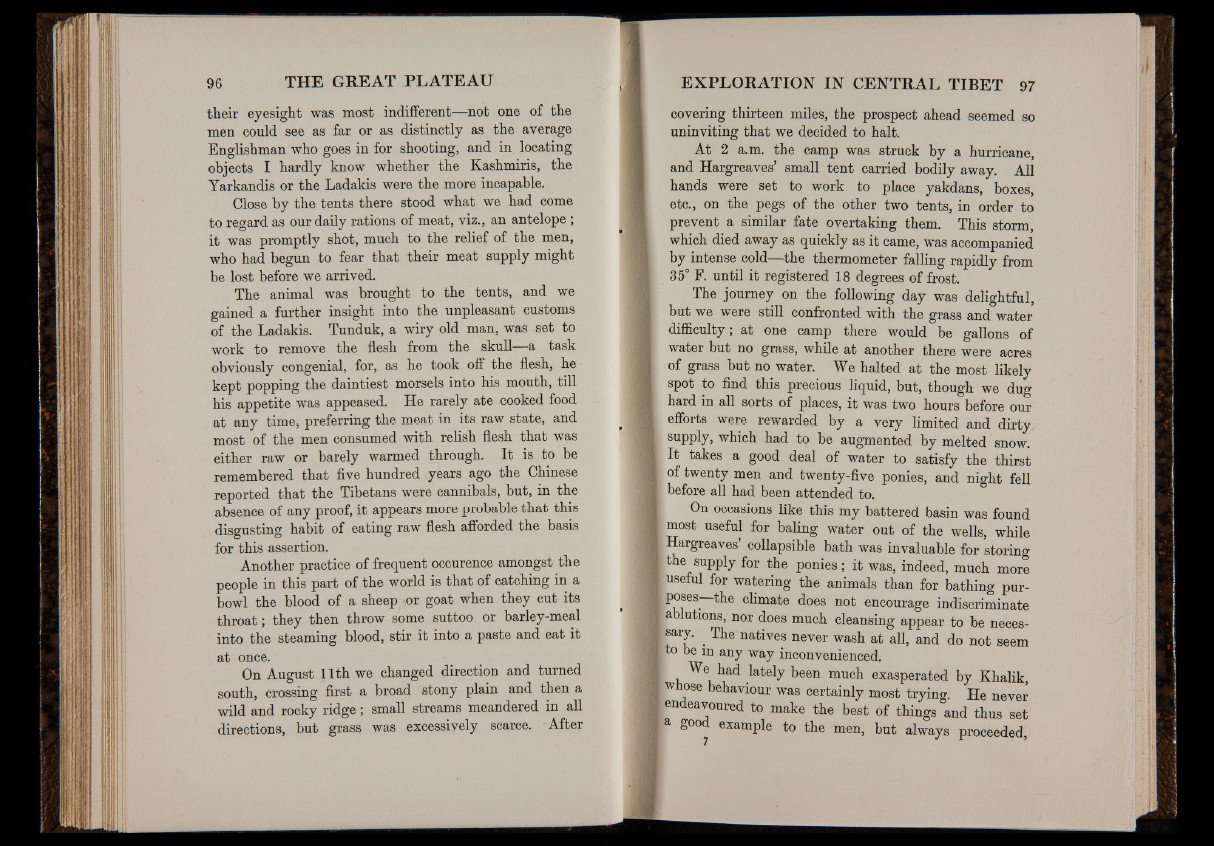
their eyesight was most indifferent—not one of the
men could see as far or as distinctly as the average
Englishman who goes in for shooting, and in locating
objects I hardly know whether the Kashmiris, the
Yarkandis or the Ladakis were the more incapable.
Close by the tents there stood what we had come
to regard as our daily rations of meat, viz., an antelope ;
it was promptly shot, much to the relief of the men,
who had begun to fear that their meat supply might
be lost before we arrived.
The animal was brought to the tents, and we
gained a further insight into the unpleasant customs
of the Ladakis. Tunduk, a wiry old man, was set to
work to remove the flesh from the skull a task
obviously congenial, for, as he took off the flesh, he
kept popping the daintiest morsels into his mouth, till
his appetite was appeased. He rarely ate cooked food
at any time, preferring the meat in its raw state, and
most of the men consumed with relish flesh that was
either raw or barely warmed through. It is to be
remembered that five hundred years ago the Chinese
reported that the Tibetans were cannibals, but, in the
absence of any proof, it appears more probable that this
disgusting habit of eating raw flesh afforded the basis
for this assertion.
Another practice of frequent occurence amongst the
people in this part of the world is that of catching in a
bowl the blood of a sheep or goat when they cut its
throat; they then throw some suttoo or barley-meal
into the steaming blood, stir it into a paste and eat it
at once.
On August 11th we changed direction and turned
south, crossing first a broad stony plain and then a
wild and rocky ridge; small streams meandered in all
directions, but grass was excessively scarce. After
covering thirteen miles, the prospect ahead seemed so
uninviting that we decided to halt.
At 2 a.m. the camp was struck by a hurricane,
and Hargreaves’ small tent carried bodily away. All
hands were set to work to place yakdans, boxes,
etc., on the pegs of the other two tents, in order to
prevent a similar fate overtaking them. This storm,
which died away as quickly as it came, was accompanied
by intense cold—the thermometer falling rapidly from
35° F. until it registered 18 degrees of frost.
The journey on the following day was delightful,
but we were still confronted with the grass and water
difficulty; at one camp there would be gallons of
water but no grass, while at another there were acres
of grass but no water. We halted at the most likely
spot to find this precious liquid, but, though we dug
hard in all sorts of places, it was two hours before our
efforts were rewarded by a very limited and dirty,
supply, which had to be augmented by melted snow.
It takes a good deal of water to satisfy the thirst
of twenty men and twenty-five ponies, and night fell
I before all had been attended to.
On occasions like this my battered basin was found
I most useful for baling water out of the wells, while
1 Hargreaves’ collapsible bath was invaluable for storing
1 the supply for the ponies; it was, indeed, much more
■ useful for watering the animals than for bathing pur-
i poses—the climate does not encourage indiscriminate
■ ablutions, nor does much cleansing appear to be neces-
Jsary. The natives never wash at all, and do not seem
■ to be m any way inconvenienced.
1 u S I had lately been mucb exasperated by Khalik,
■wbose behaviour was certainly most trying. He never
■endeavoured to make the best of things and thus set
■ g example to the men, but always proceeded,